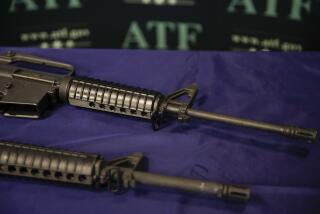Browning Rejects Gun Settlement With U.S.
- Share via
MORGAN, Utah — Firearm manufacturer Browning, distributor of the Winchester brand rifle, on Monday said it will not join competitor Smith & Wesson in a deal with the U.S. government to include a range of safety measures.
“They’re asking the companies to exercise regulatory authority,” said Rich Bauter, a company vice president.
On March 17, Smith & Wesson, the world’s largest manufacturer of handguns, shocked gun-rights advocates by agreeing to about 80 reforms, including many provisions that President Clinton has tried and failed to get Congress to mandate.
The company pledged to put trigger locks on all its handguns, to make gun grips too big and triggers too powerful for young children to fire, to imprint a hidden second serial number on guns to deter theft, and to develop “smart” technology that would allow only an authorized user to fire a gun.
In exchange, the federal government agreed to drop its threat to join 30 municipalities suing firearm makers to recover the cost of gun violence. Browning is among the targets of the suit.
In a statement, Browning said: “After a careful review of the agreement signed by Smith & Wesson, we have determined that we cannot sign any similar agreement.”
In January 1999, Browning, owned by Belgium’s FN Herstal, voluntarily began including child-safety locks on its firearms, rifles and shotguns as well as handguns.
Bauter said the problem was not child-safety locks but other issues in the agreement, including expanding background checks for gun purchases.
Browning said: “Finally, we believe it is wrong, as a matter of law, to hold any manufacturer of a legal and non-defective product liable for the misuse of that product.”
Last week Glock Inc., one of the nation’s biggest gun makers, refused to agree to government restrictions on its manufacturing and marketing operations. Glock is also a defendant in a number of lawsuits brought by various government entities.
More to Read
Inside the business of entertainment
The Wide Shot brings you news, analysis and insights on everything from streaming wars to production — and what it all means for the future.
You may occasionally receive promotional content from the Los Angeles Times.










